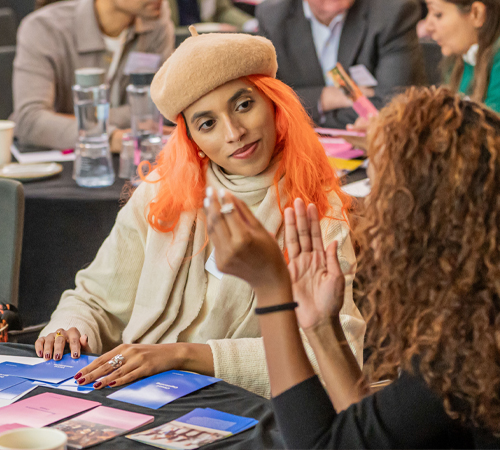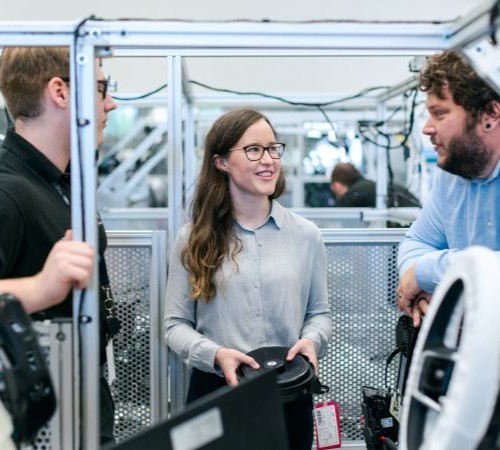Introduction
At the Royal Academy of Engineering, we believe that a skilled, diverse engineering community must be supported by inclusive cultures. We know that inclusive cultures aren’t just good practice; they’re essential for innovation, resilience, and long-term success. That’s why we launched Culture+, to help engineering startups, scaleups, and SMEs create and foster inclusive cultures into as they grow and scale.
Through our journey, we’ve worked with over 50 organisations to turn culture into something measurable and actionable. The insights we’ve gained reveal clear, tangible barriers to inclusion, from psychological safety to decision-making dynamics. These aren’t abstract ideas; they’re real factors that shape how teams perform and grow.
The following three findings highlight where inclusive practices can make the biggest difference. They’re a call to action for leaders to build cultures where everyone can thrive.

Key insights from the report
1. In-group dynamics: the ‘in-group’ in engineering is typically men aged 35 to 54, though this can vary between organisations.
Our findings show that women and people outside this group report significantly more negative workplace experiences, highlighting a persistent disparity in how inclusion is felt.
Why is this important?
If you’re part of the in-group, your experience may not reflect that of your colleagues. Recognising this is the first step toward fostering inclusion. Diversity isn’t just about representation, it’s a proven driver of broader perspectives, stronger problem-solving, and more innovation.
But here’s the challenge: when representation is low, those from underrepresented groups often feel isolated, hyper-visible, or vulnerable. That’s why psychological safety is vital. If someone is the only one in the room who looks like them or shares their lived experience, they’re less likely to speak up, contribute fully, or stay long-term.
An inclusive culture is one where everyone – not just those in the in-group – feels valued, heard, and safe, ensuring talent can thrive.

2. Women face greater challenges than men.
Our findings show that women consistently rate their colleagues lower when it comes to receiving constructive feedback and hearing inclusive language. These may seem like small moments, but over time, they add up. And they matter.
Why is this important?
High-quality feedback is essential for learning, growth, and innovation. Without it, individuals are less likely to develop, take risks, or advance. Inclusive language shapes whether people feel respected and seen. When these elements are missing, it’s not just morale that suffers, it’s performance, retention, and progression.
This may help explain why women, particularly between the ages of 34 and 44, are leaving engineering at higher rates. At this stage, many are reaching key career milestones. Losing them means losing future leaders, institutional knowledge, and diverse thinking at the very point it could have the most impact.
If we want to unlock the full potential of our talent – and retain it! – we need to build day-to-day cultures where feedback is fair and language is inclusive.

3. Managers may not see the whole picture.
Our research shows that managers rate workplace collaboration more positively than non-managers do. This gap suggests that many leaders may be experiencing a filtered version of reality—one where collaboration seems smooth, while their teams feel otherwise.
Why is this important?
When managers assume things are working well without checking in meaningfully across the team, blind spots develop. These might stem from spending more time with certain individuals, overlooking quieter voices, or assuming only some team members need guidance.
The result is reduced psychological safety, uneven support, and a breakdown in cross-functional collaboration – all of which will hinder innovation, decision-making, and delivery.
Leaders play a pivotal role in shaping team culture. A truly inclusive culture requires managers to intentionally seek out diverse perspectives, spend time equitably with all team members, and regularly reflect on who may not be speaking up and understanding why.

Want to dive deeper?
Download the full report to explore detailed findings and actionable strategies to create a more inclusive, innovative workplace.
Contact us
For further information about this project or if you have questions, please contact [email protected].
Related content
Culture+ is your pathway to an inclusive culture
Our new platform provides engineering startups and scaleups with the tools to foster an inclusive company culture, buil…
Enterprise Hub
We believe the solutions to today’s most complex economic and social challenges lie in the minds of the brightest engin…
Equity, diversity and inclusion: research and resources
Explore our Equity, diversity and inclusion research and resources. Discover best practices, tools, and guides to foste…
EDI Engine: Business benefits of equality, diversity and inclusion in engineering
Discover compelling evidence and actionable insights on the benefits of equality, diversity and inclusion (EDI) to engi…
